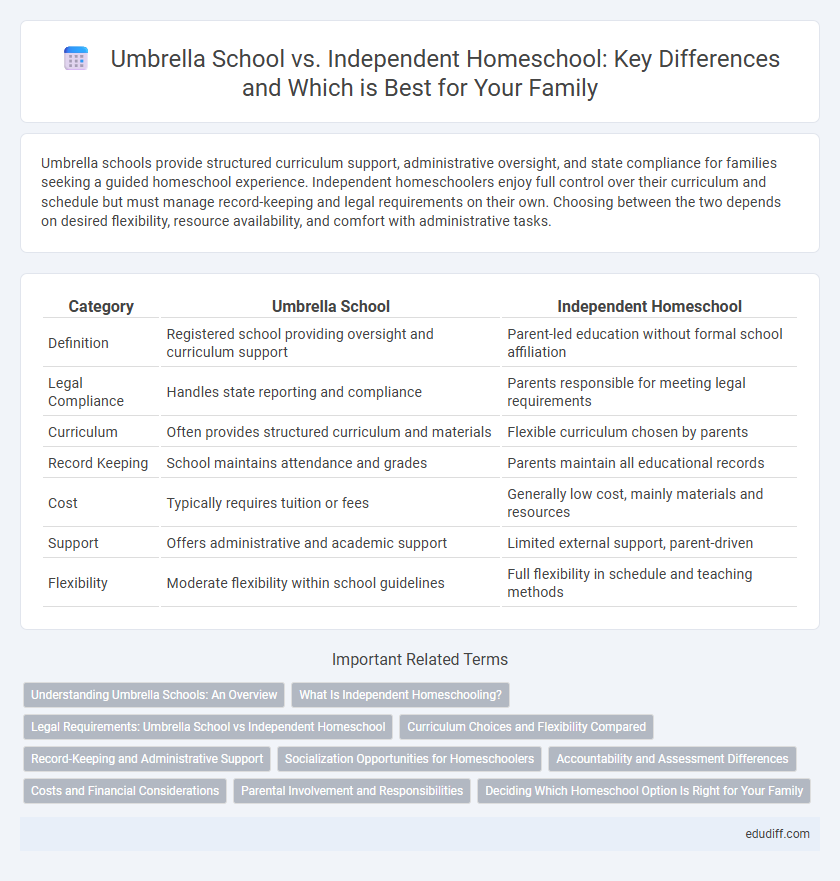Umbrella schools provide structured curriculum support, administrative oversight, and state compliance for families seeking a guided homeschool experience. Independent homeschoolers enjoy full control over their curriculum and schedule but must manage record-keeping and legal requirements on their own. Choosing between the two depends on desired flexibility, resource availability, and comfort with administrative tasks.
Table of Comparison
| Category | Umbrella School | Independent Homeschool |
|---|---|---|
| Definition | Registered school providing oversight and curriculum support | Parent-led education without formal school affiliation |
| Legal Compliance | Handles state reporting and compliance | Parents responsible for meeting legal requirements |
| Curriculum | Often provides structured curriculum and materials | Flexible curriculum chosen by parents |
| Record Keeping | School maintains attendance and grades | Parents maintain all educational records |
| Cost | Typically requires tuition or fees | Generally low cost, mainly materials and resources |
| Support | Offers administrative and academic support | Limited external support, parent-driven |
| Flexibility | Moderate flexibility within school guidelines | Full flexibility in schedule and teaching methods |
Understanding Umbrella Schools: An Overview
Umbrella schools provide structured support, legal oversight, and curriculum guidance for families choosing to homeschool, ensuring compliance with state education regulations. Unlike independent homeschooling, which requires parents to manage all aspects of their child's education independently, umbrella schools facilitate record-keeping, standardized testing, and access to extracurricular activities. These programs serve as an intermediary between traditional public schooling and homeschooling, offering resources and administrative assistance to streamline educational management.
What Is Independent Homeschooling?
Independent homeschooling is a personalized education approach where parents take full responsibility for designing and implementing their child's curriculum without enrolling in a formal umbrella school. This method allows for complete flexibility in subject choice, pacing, and teaching style, tailored specifically to the child's unique learning needs and interests. Unlike umbrella schools that provide structured oversight and record-keeping, independent homeschoolers manage all administrative tasks, including record maintenance, compliance with state laws, and reporting.
Legal Requirements: Umbrella School vs Independent Homeschool
Umbrella schools provide a structured legal framework that ensures compliance with state homeschooling laws and standardized reporting, which reduces the administrative burden on families. Independent homeschooling requires parents to familiarize themselves with and adhere directly to state-specific legal requirements, including curriculum standards, attendance records, and periodic assessments. Choosing between an umbrella school and independent homeschooling impacts how legal responsibilities are managed and how compliance is demonstrated to educational authorities.
Curriculum Choices and Flexibility Compared
Umbrella schools provide a structured curriculum with state-approved courses, offering certified support and assessment, which benefits families seeking guidance and standardized learning paths. Independent homeschooling allows for tailored curriculum choices, granting maximum flexibility to adapt teaching methods and content based on the child's individual learning pace and interests. The key distinction lies in umbrella schools balancing regulatory compliance with oversight, while independent homeschooling prioritizes personalized education with fewer constraints.
Record-Keeping and Administrative Support
Umbrella schools offer structured record-keeping and administrative support, ensuring students meet state requirements while relieving parents of bureaucratic tasks. Independent homeschool families manage their own records and compliance, requiring diligent organization and familiarity with homeschooling laws. Choosing between them depends on how much administrative responsibility parents wish to assume during homeschooling.
Socialization Opportunities for Homeschoolers
Umbrella schools provide structured socialization opportunities through group activities, field trips, and classes, fostering peer interaction within a supervised environment. Independent homeschoolers often create personalized social experiences by joining co-ops, community sports, and local clubs to ensure diverse social engagement. Both approaches offer flexible socialization tailored to individual needs, but umbrella schools typically offer more organized social frameworks.
Accountability and Assessment Differences
Umbrella schools provide structured accountability through mandatory reporting, standardized testing, and adherence to state regulations, ensuring consistent assessment of student progress. Independent homeschoolers have greater flexibility in curriculum choice and assessment methods but may face less formal oversight, relying on parental records and periodic evaluations. This distinction impacts how student achievement is monitored and verified in differing homeschooling environments.
Costs and Financial Considerations
Umbrella schools often require tuition fees ranging from $500 to $2,000 annually, covering curriculum access, record-keeping, and state compliance, which can ease financial and administrative burdens for families. Independent homeschooling eliminates tuition costs but may result in higher expenses for curriculum materials, extracurricular activities, and standardized testing, averaging $300 to $1,000 per year depending on resources chosen. Families should assess budget constraints and consider state regulations impacting funding, tax benefits, and allowable expenses when deciding between umbrella school enrollment and independent homeschooling.
Parental Involvement and Responsibilities
Umbrella schools provide structured curriculum and administrative support, reducing parents' daily teaching responsibilities while still requiring active supervision and engagement. Independent homeschool demands full parental responsibility for lesson planning, instruction, and record-keeping, necessitating a higher time commitment and educational involvement. Choosing between the two depends on the desired level of parental control and the capacity to manage educational duties.
Deciding Which Homeschool Option Is Right for Your Family
Choosing between umbrella school and independent homeschool depends on your family's need for structure versus flexibility; umbrella schools provide curriculum support, record-keeping, and state compliance assistance, while independent homeschooling allows full control over educational content and pacing. Consider your comfort with managing legal requirements and lesson planning, as umbrella schools can reduce administrative burdens, whereas independent homeschooling demands more parental involvement. Evaluating your child's learning style and your family's schedule can help determine which option aligns best with your educational goals and lifestyle.
Umbrella School vs Independent Homeschool Infographic

 edudiff.com
edudiff.com